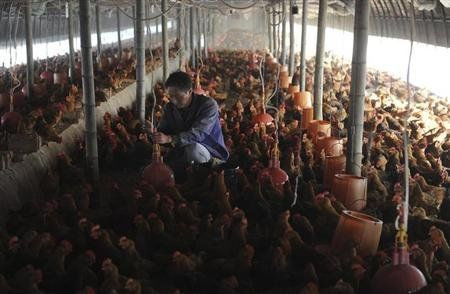Tyson Foods (TSN) Builds Sanitary Chicken Farms In China To Reassure Food Safety

Tyson Foods Inc. (NYSE:TSN) is building its own chicken farms in China to address the worlds' largest chicken market's growing food safety concerns and to establish a presence there.
The company will spend hundreds of millions of dollars to build huge, supersanitary chicken farms in China. That strategy reverses Tyson's worldwide model of purchasing chickens from independent farmers and marketing them. China's rampant food safety problems including bird flu outbreaks precludes that model in China, the Wall Street Journal reported on Monday.
Tyson has built 20 of the new farms in China ver the last two years. By 2015, the company plans to have 90 farms to supply its processing plants. The company hopes to double its Chinese production to three million birds a week to help offset Tyson’s sluggish U.S. growth.
"We just can't build the [chicken] houses fast enough, and we're going absolutely as fast as we know how to go," said Donnie Smith, Tyson’s Chief Executive, according to the Wall Street Journal.
By the estimates of CLSA Americas LLC, Tyson’s China revenue was about $715 million in the fiscal year ended in September, and will reach $1.1 billion by the fiscal year of 2015.
Tyson’s China model will be different from its U.S. system. In the U.S. the company buys chickens from its 4,000 contracted farmers who raise about 100,000 birds at a time and shoulder the risk and logistical hassles.
China’s chicken market on the other hand is dominated by small-scale farms. At a time when safety is China's top concern these difficult-to-monitor farms make companies balk at putting their brand on meat they have not raised. That's especially true after bird flue outbreaks and other health scares in the last year.
While Tyson's been processing chicken in China since 2001 its heavy investment in new farms and processing plants has eroded the company’s profits in recent years. However, the company expects to be profitable once more in China by the last quarter of 2014. It also plans to increase its international sales by at least 12 percent annually over the next few years, the Wall Street Journal reported.
© Copyright IBTimes 2024. All rights reserved.





















